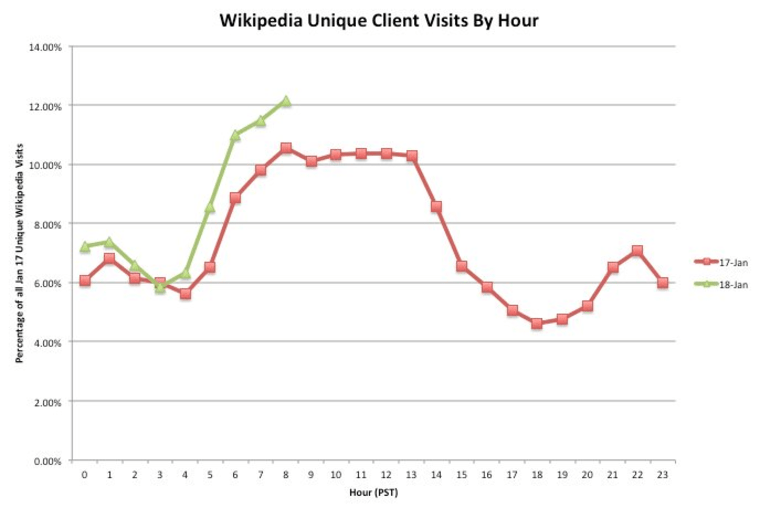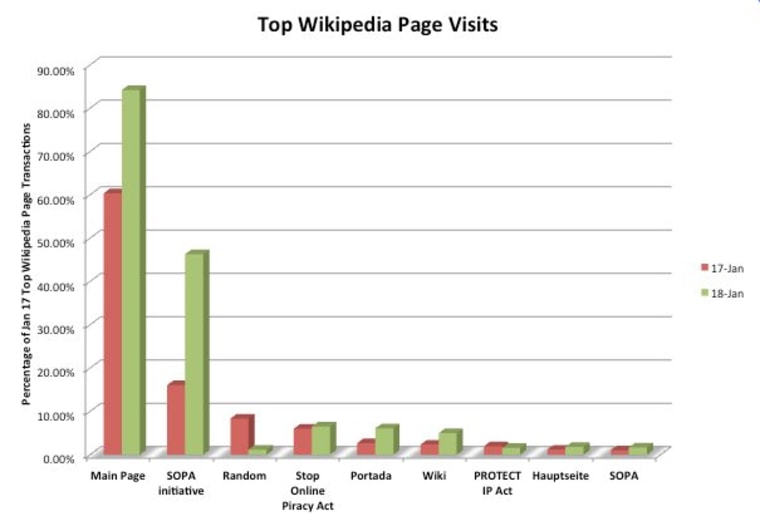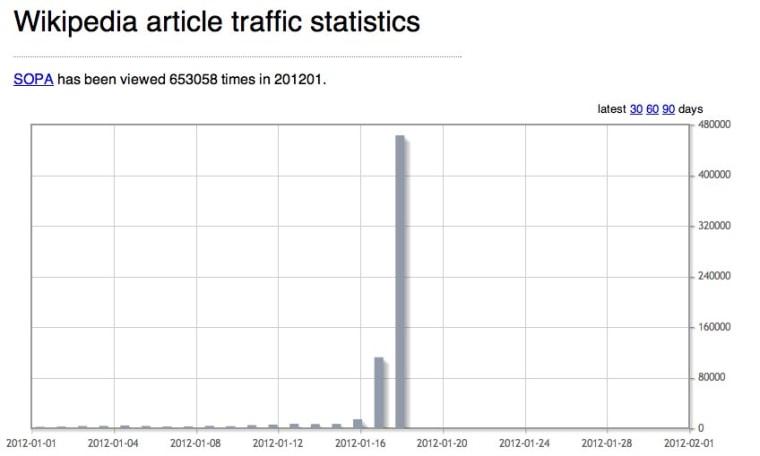
Despite a self-imposed blackout yesterday to protest SOPA/PIPA, Wikipedia's English language website attracted more traffic on Wednesday than the previous day, and millions learned about the proposed legislation.
In the 24 hours Wikipedia blacked out its content (though, as we told you yesterday, there were ways of getting around that), more than 162 million viewed the Wikipedia home page, through which more than eight million looked up their elected representatives' contact information via the tool provided there. (You can also find out via this U.S. House of Representatives link.)
As a result of Wikipedia and other efforts pointing voters to state reps, congressional websites were overwhelmed with traffic — enough to shut them down temporarily. By the end of the day, 18 senators defected to the other side of PIPA, no longer supporting it.
Wikipedia also found that, "At one point,#wikipediablackout constituted 1% of all tweets, and SOPA accounted for a quarter-million tweets hourly during the blackout."
In its post mortem of the blackout's effects, Wikipedia offers a FAQ for those interested in following the progress of SOPA and PIPA, which it says is not dead, "not at all." One answer sums up Wikipedia's position on the proposed legislation: "These bills are presented as efforts to stop copyright infringement committed by foreign web sites, but in our opinion, they do so in a way that would disrupt free expression and harm the Internet."
More than 12,700 have commented on Wikipedia's blog post announcing the blackout.
Security company Zscaler tracked a "noticeable" uptick in unique visitors to the online encyclopedia in the first 8 hours of the Jan. 18, though "these additional visitors are not incurring that much more bandwidth for Wikipedia" in that there was "only a slight percentage increase in Wikipedia web transactions today." So, people weren't going to Wikipedia to dilly dally — they spent time on fewer entries. At least in the first half of the day. (I'm sure news accounts like ours helped fill in the missing pieces.)
The top visited pages yesterday, besides the home page, was — wait for it — the SOPA initiative, as people were probably trying to figure out why they were being blocked from easy access to Wikipedia. Zscaler dubbed such behavior as "online rubber necking." (I call it normal curiosity.)

Another set of statistics shows the dramatic interest in SOPA that culminated in yesterday's online stampede to find out more about it. A Lithuania-based database engineer at Facebook, Domas Mituzas, who also does software development for Wikipedia, "put together a system to gather access statistics from Wikipedia's squid cluster" and a visualization of that data appears on this site.
There, you can search for any article in Wikipediaand find out how many page views it had in whatever month you choose in the drop down menu. For Jan. 2012, searches for SOPA on Wikipedia led to the article being viewed 653,058 times this month. On Jan. 18, it was viewed nearly 463,000 times, so that one day accounted for most of the views so far this month. As you can see from the chart below, the page views on the day before, the 17th, was only 112,170.

Based on our informal poll from yesterday, the overwhelming majority of you weren't annoyed with the lack of easy access to Wikipedia yesterday (81 percent of 1,355 votes). Obviously, those who wanted to get to it got to it yesterday, one way or another.
(Msnbc.com is a joint venture of Microsoft and Comcast/NBC Universal. Microsoft publicly opposes SOPA in its current form, while Comcast/NBC Universal is listed as a supporter of SOPA on the House Judiciary Committee website.)
More stories:
- How to access Wikipedia during the SOPA blackout
- What an Internet protest looks like
- In wake of Web blackout, SOPA/PIPA support weakens
Check out Technolog on Facebook, and on Twitter, follow Athima Chansanchai, who is also trying to keep her head above water in the Google+ stream.